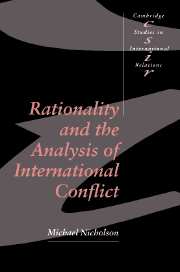Book contents
- Frontmatter
- Contents
- Preface
- Introduction: Rationality and the analysis of conflict
- PART I CONFLICT
- PART II RATIONAL BEHAVIOUR
- PART III RATIONAL BELIEF: SOME TOPICS IN CONFLICT ANALYSIS
- 8 THE STATISTICAL ANALYSIS OF WARLIKE PHENOMENA
- 9 ARMS AND ARMS RACES
- 10 ECOLOGY AND THE FREE-RIDER
- 11 THE THEORY OF ALLIANCES
- PART IV CONCLUSION
- References
- Index
- Titles in the series
9 - ARMS AND ARMS RACES
Published online by Cambridge University Press: 24 November 2009
- Frontmatter
- Contents
- Preface
- Introduction: Rationality and the analysis of conflict
- PART I CONFLICT
- PART II RATIONAL BEHAVIOUR
- PART III RATIONAL BELIEF: SOME TOPICS IN CONFLICT ANALYSIS
- 8 THE STATISTICAL ANALYSIS OF WARLIKE PHENOMENA
- 9 ARMS AND ARMS RACES
- 10 ECOLOGY AND THE FREE-RIDER
- 11 THE THEORY OF ALLIANCES
- PART IV CONCLUSION
- References
- Index
- Titles in the series
Summary
THE SIGNIFICANCE OF ARMAMENTS
Wars are fought with weapons. If there were no weapons, presumably there would be no wars. However, if some people have weapons and some do not, then those with weapons can impose their will on those without. Put rather crudely, this is a crucial dilemma of the way the world is run, without any easy or obvious ways out of it. The relationship between armaments and war is still controversial, though research is being done which is beginning to shed some light on the problem.
Crudely there are two polar views about the relationship between arms levels (not arms races) and war. The first is that the crucial thing about arms levels between two states or alliances is that they should be balanced, so that there is, in Bull's terminology (1977), a simple balance of power. In its extreme form this can hold that the level of arms is unimportant; what matters is the balance. This is the view held by many traditional strategists. The other view is that what is important is the total quantities of arms held by the two countries, where the more there are, the greater the risk of war. The distribution between the two is unimportant. Richardson held this view, and it was oddly one of the few propositions which he asserted without testing.
- Type
- Chapter
- Information
- Rationality and the Analysis of International Conflict , pp. 164 - 186Publisher: Cambridge University PressPrint publication year: 1992

